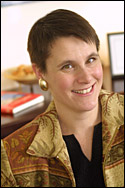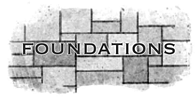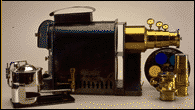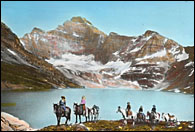Kaleidoscope
Robin Geller: Specifics for a Secretary-General
 PHOTO: Owen Egan
PHOTO: Owen Egan |
|
Not only is there a new Principal at the helm this semester, but a new Secretary-General, too. Robin Geller has made the shift from being Registrar and Director of Administration and Recruitment to a shorter, but equally imposing sounding title of Secretary of McGill College and University, responsible for the University Secretariat. So, uh, what is that exactly, anyway?
"A secretary-general is responsible for a number of activities," Geller says, cheerful in her new bright office in James Administration, "and provides support to Senate, the Board of Governors, and their committees. That means we facilitate the process, make sure the committees meet, and we follow up to make sure the work they set out to do takes place." She adds, "neutrality is very important."
The Secretary-General has to be fair-minded and impartial, as she will oversee university-wide elections, staff grievances, student appeals, and tenure administration. Not to mention ensuring that search committees for new deans, vice-principals, and other senior staff are properly constituted.
The University Archives and Translation Office also report to her, as did, up until recently, the Legal Services. Now all matters legal report directly to the Principal -- this is a recent change made by Munroe-Blum. Geller, a lawyer, fully supports it. "There should be no intermediary between the head of the institution and the legal department."
The job's not all text and adjudication -- Geller also gets to be a party planner. Convocation duties used to be shared between Registrars and the Secretariat, but as of two years ago fell solely into the Secretariat's horn-tooting, confetti-tossing hands.
"Convocation's going to be fun. It's a mixture of dealing with honorary degree recipients and with students -- everything from soup to nuts, from the flowers on the stage to the diplomas handed out."
Geller's first big fun-filled event will be the Installation for Munroe-Blum. There will be a symposium, awarding of honorary degrees and the installation ceremony proper. The planning started months ago with securing rooms and dates. As early as December invitations started being sent out.
The Installation has required cross-campus planning. The Development Office is helping with the lunch, the Faculty of Music will provide the tunes, School of Architecture Director David Covo is helping set up Redpath Hall. The next day, on Tuesday afternoon, the principal will meet the community at a public reception in the lobby of the Arts building.
So, is Geller having a good time yet? "The learning curve is very sharp, very steep," she says, "you have to hit the ground running." It's not as though meetings can be postponed while she steadies herself. "It's a challenge to learn everything as quickly as I want to.
"But I'm already having fun, I like learning new skills. It will be easier when I've gone through everything once." Geller figures that three months will pass before she's met with all the groups her office is responsible for.
Geller's sure her analytical skills gleaned from degrees in civil engineering and law will come in handy, along with a knack for communications. Geller must review many documents and clearly distill gobs of information to bring to various governing bodies.
"Strong organizational skills are essential," Geller says, as she keeps track of so many events and meetings at once, "along with strong interpersonal skills because you're dealing with so many members of the university.
"And it doesn't hurt to be able to type quickly," Geller laughs.
Covering Senate's a challenge because of its length and complexity. "I was surprised how hard it is to keep track and put out useful notes," Geller says. "A practice Victoria established was to get the minutes done immediately after the meeting."
Not only do meeting minutes have to be an accurate, clear reflection of what was said, her office must provide clearly worded documents to the members, along with context and background. Yet Geller looks forward to the writing her new job entails. And she feels lucky that her job is eased by her "outstanding" staff, who are extremely capable, competent, and very supportive.
Her whirlwind work life is steadied by her lawyer husband and two boys, aged nine and ten. "Family forces a balance on your life, makes you efficient," she says. In order to make it home to spend time with the family, she runs a tightly sequenced day. Her boys play inter-city hockey in the winter, soccer in the summer.
Her sport? Squash, and it's rumoured she's a demon player. Unfortunately, a shoulder injury is keeping her off the courts where she fiercely takes on the likes of Alfonso Mucci, McGill oceanographer. "I miss squash and I miss those guys." But don't let up practice, Al -- her physiotherapy's going well and she hopes to be back on the courts by spring.
 |
||||
|
There is no question that it is a puzzle... Some people like to imagine that it is an art form. |
||||
Foundations
 |
|
Magic lanterns
For anyone who has ever cursed the vagaries of PowerPoint, or become unhinged trying to bend a recalcitrant slide projector to their will, spare a thought for the operators of the magic lantern. At least your laptop is unlikely to catch fire.
An elegantly simple machine, a magic lantern used technology that has been around since the days of the Pharaohs. A box, with a light that would project through a semi-transparent image onto a screen and voila! Magic!
 PHOTO: McCord Museum
PHOTO: McCord Museum |
|
For centuries the magic lantern was never so common or easy to use that Elizabethan Lords were able to bore guest with projected depictions of Lord Syndingham splashing on the beaches of Brittany.
But by the 19th century, with the advent of brightly burning, cheap kerosene and the photographic plate the application of the magic lantern as an entertainment and pedagogical technology began in earnest. At McGill, this was accelerated in the 1890's when the electrical facilities here improved so that the lanterns could be used in large halls.
As with any new technology in the classroom, some professors adapted more readily than others. Frank Dawson Adams used the devices until the end of his teaching career in 1924 and the entire Faculty of Medicine used them extensively.
And just as computers and the internet are used for distance learning today, the magic lantern was used for that purpose in the early part of this century. Kits of slides and narration booklets could be mailed to interested parties on a variety of topics: history, geography, science, religion and natural science. Lectures would usually be given by a local schoolteacher, minister or priest.
 PHOTO: McCord Museum
PHOTO: McCord Museum |
|
The slides themselves were often miniature works of art -- in the sciences they could be actual biological specimens on the glass, or reproductions of artworks. It was even possible to project experiments on screen (beat that, Microsoft!) The most striking visuals are black and white photographic plates that were coloured in by an artist. Although the colours never look quite right, the effect was always fascinating.
The McCord Museum has a collection of 1,250 slides from McGill's travelling slide-shows with loads of fascinating historical and technical detail -- not to mention two 'virtual lectures' on their website. Please check it out at: www.mccord-museum.qc.ca.
 |
||||
|
Employers who might want to consider allowing their employees to take power naps can be assured a short nap is beneficial. |
||||

